Unit 12 Life is full of the unexpected Section A课件(3课时)
文档属性
| 名称 | Unit 12 Life is full of the unexpected Section A课件(3课时) |  | |
| 格式 | zip | ||
| 文件大小 | 3.2MB | ||
| 资源类型 | 教案 | ||
| 版本资源 | 人教新目标(Go for it)版 | ||
| 科目 | 英语 | ||
| 更新时间 | 2017-02-27 10:05:01 | ||
图片预览

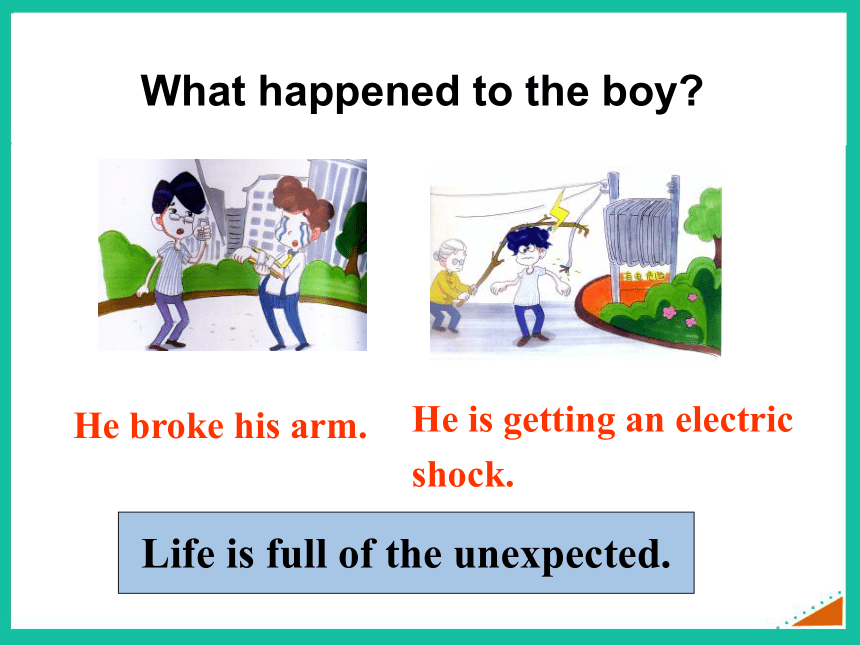
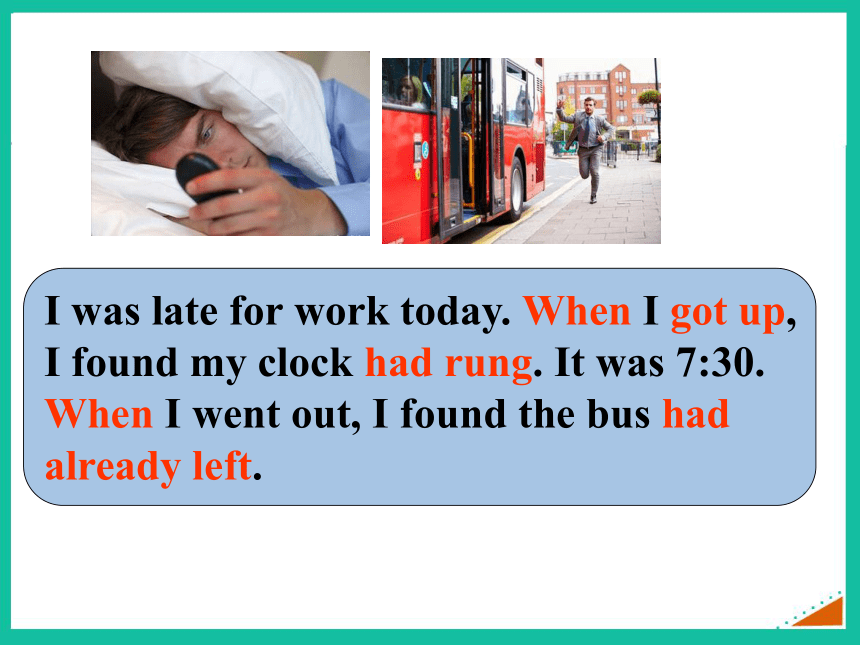
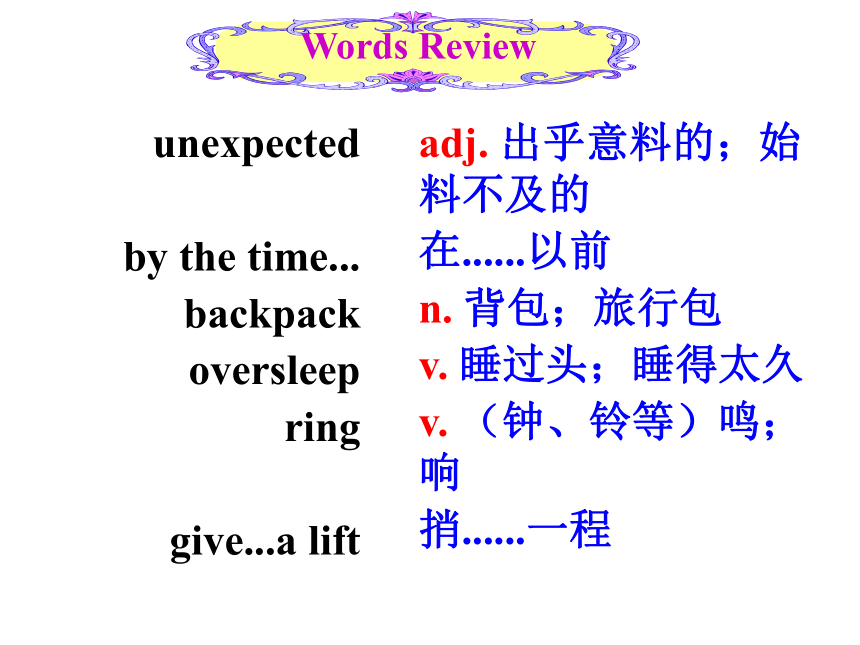
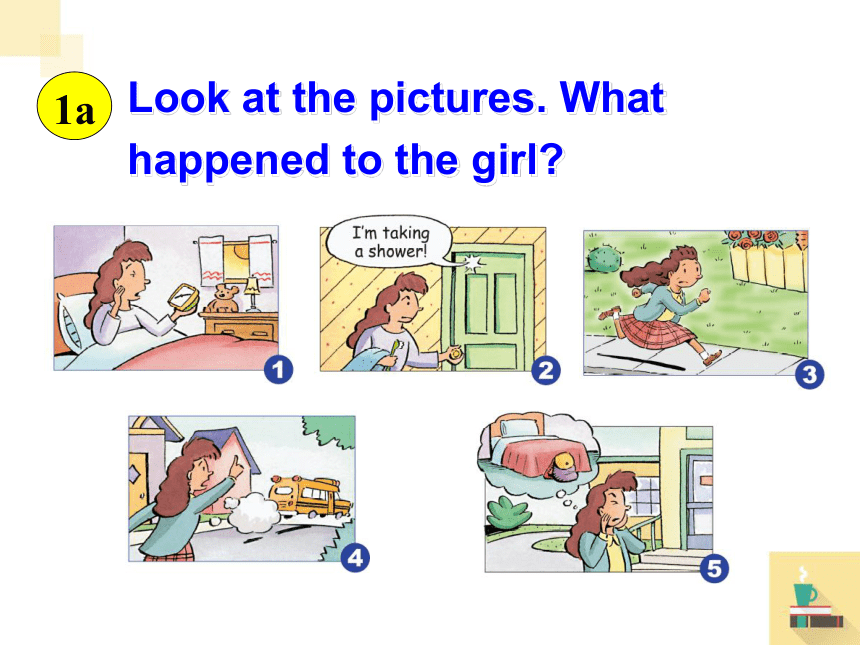
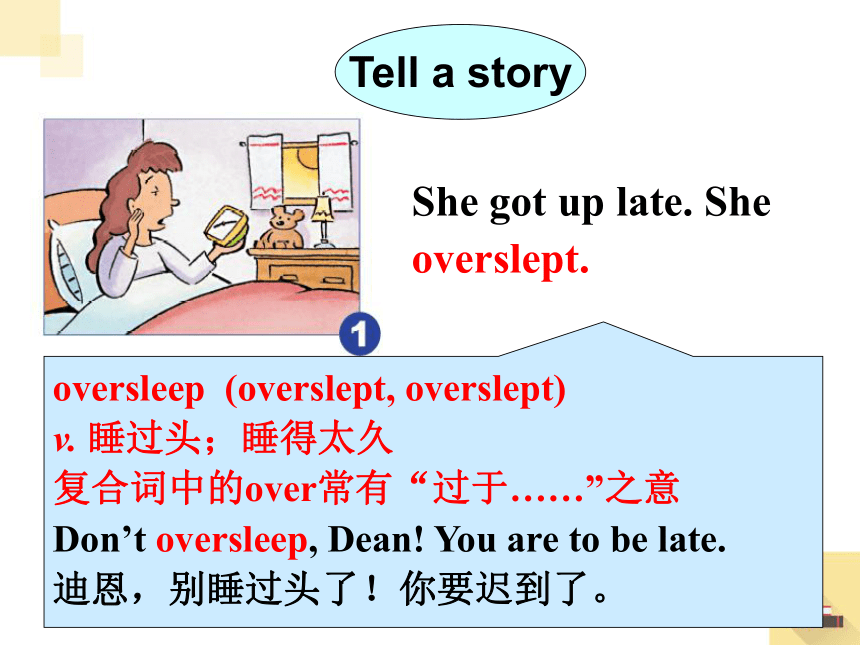

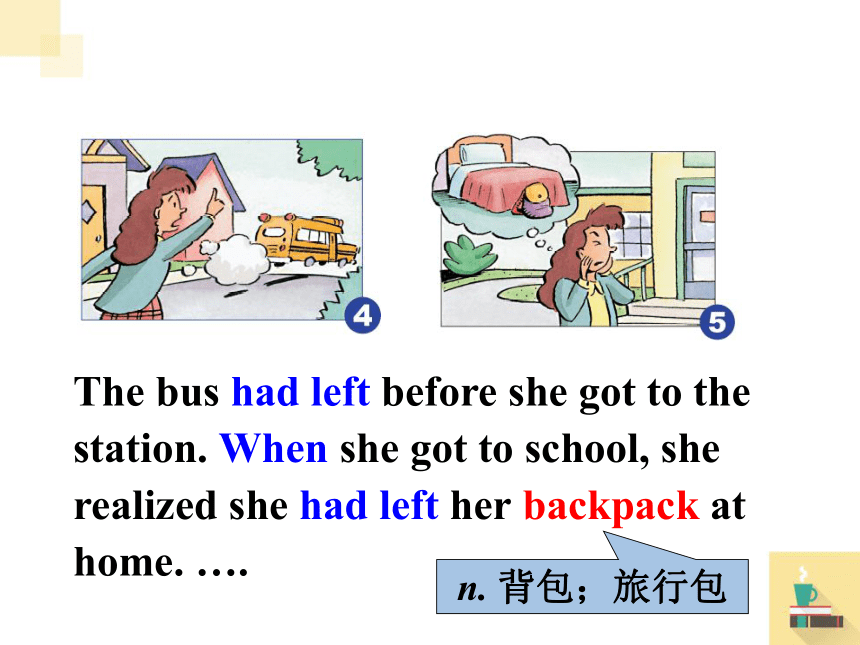
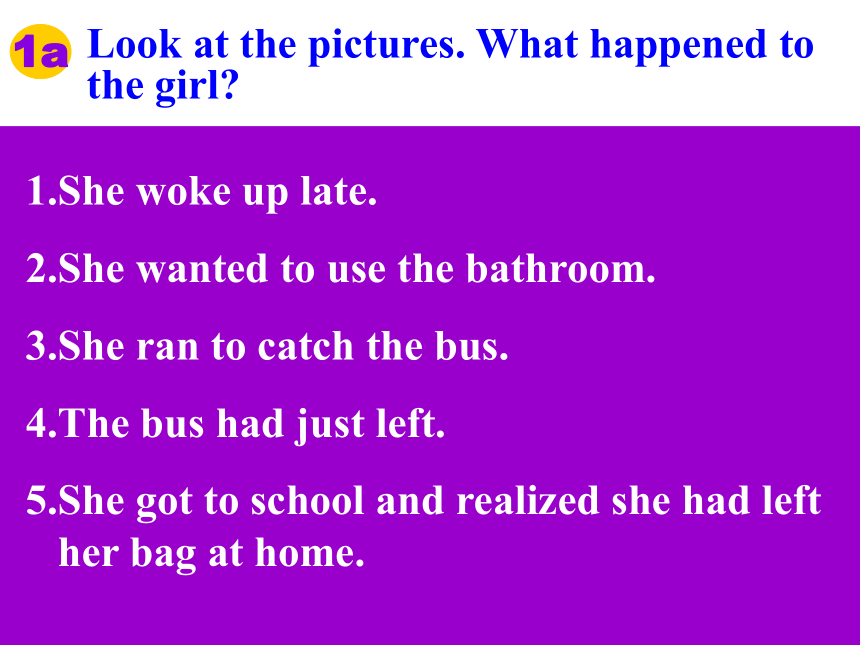
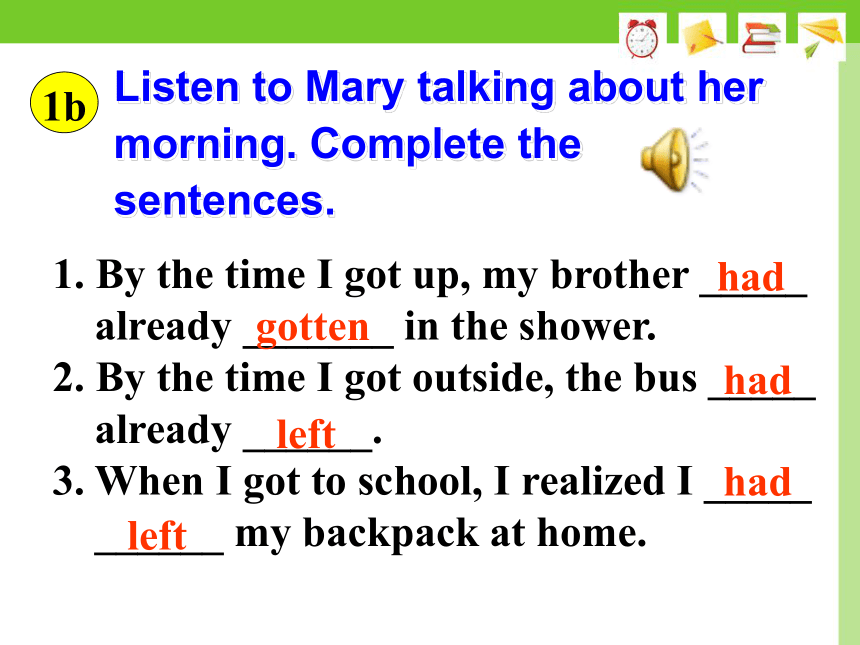
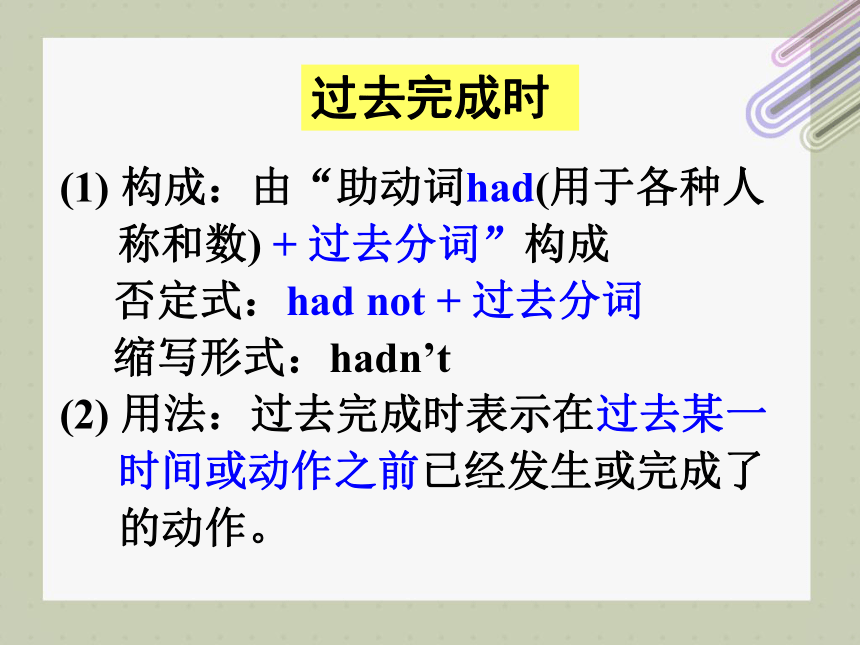
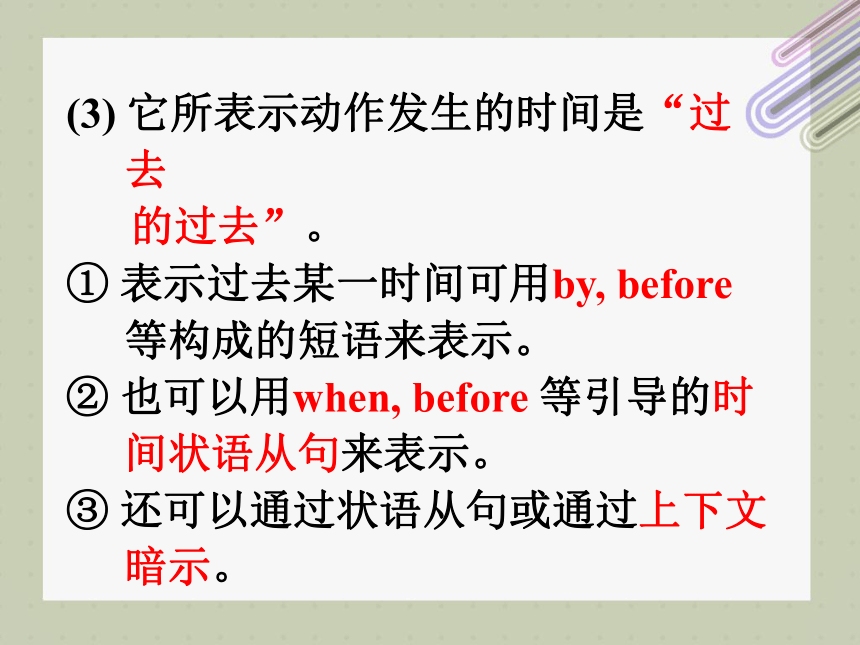
文档简介
课件75张PPT。Unit 12
Life is full of the unexpected.Section AHe broke his arm.He is getting an electric shock.What happened to the boy?Life is full of the unexpected.I was late for work today. When I got up, I found my clock had rung. It was 7:30. When I went out, I found the bus had already left. unexpected
by the time...
backpack
oversleep
ring
give...a liftadj. 出乎意料的;始料不及的
在......以前
n. 背包;旅行包
v. 睡过头;睡得太久
v. (钟、铃等)鸣;响
捎......一程1aLook at the pictures. What happened to the girl?She got up late. She overslept.Tell a storyoversleep (overslept, overslept)
v. 睡过头;睡得太久
复合词中的over常有“过于……”之意
Don’t oversleep, Dean! You are to be late.
迪恩,别睡过头了!你要迟到了。By the time she got up, someone had already gotten in the bathroom. She rushed out the door. 在……以前The bus had left before she got to the station. When she got to school, she realized she had left her backpack at home. …. n. 背包;旅行包1aLook at the pictures. What happened to the girl? She woke up late.
She wanted to use the bathroom.
She ran to catch the bus.
The bus had just left.
She got to school and realized she had left her bag at home.1. By the time I got up, my brother _____ already _______ in the shower.
2. By the time I got outside, the bus _____ already ______.
3. When I got to school, I realized I _____ ______ my backpack at home.1bListen to Mary talking about her morning. Complete the sentences.hadgottenhadlefthadleft过去完成时(1) 构成:由“助动词had(用于各种人称和数) + 过去分词”构成
否定式:had not + 过去分词
缩写形式:hadn’t
(2) 用法:过去完成时表示在过去某一时间或动作之前已经发生或完成了的动作。(3) 它所表示动作发生的时间是“过去
的过去”。
① 表示过去某一时间可用by, before 等构成的短语来表示。
② 也可以用when, before 等引导的时间状语从句来表示。
③ 还可以通过状语从句或通过上下文暗示。例如:
When I got there, you had already eaten your meal.
当我到达那里时,你已经开始吃了。
By the time he got here, the bus had left.
在他到达那里之前,汽车已经离开了。Practice1cTake turns being Mary. Look at the pictures and talk about what happened this morning. I overslept. By the time I got up, my brother had already gotten in the shower.What happened?So, after he out of the shower, I took a quick shower and got dressed. But by the time I went outside, the bus had already left.Oh, what a pain!Oh, yes! So I ran all the way to school. But when I got to school, I realized I had left my backpack at home. Oh, no!No wonder you look stressed.2aListen to Marry continue her story. Number the pictures (1-4) in the correct order. 13242bFill in the blanks with the correct forms of the verbs in the brackets. Then listen again and check your answers.When I _____ (get) home, I realized _______ (leave) my keys in the backpack.
By the time I ______ (get) back to school, the bell _________(ring).
By the time I ______ (walk) into class, the teacher ___________ (start) teaching already.gothad leftgothad rungwalkedhad started2cMake up an ending for the story and share it with your partner.The teacher looked at Mary and asked her to hand in the homework. Mary felt so embarrassed. She forgot to take her backpack! This made her want to ran out of the classroom. She tried her best to calm down and told her teacher what had happened in the morning. When she was telling her unexpected story, Mary’s fairy godmother suddenly made her homework appear in her hand.Think about various endings and share them with your partner.2cMake up an ending for the story and share it with your partner. The teacher looked at Mary and asked her if she had finished the homework. Mary told her the unexpected things she met with this morning but they sound like excuses to the teacher. Therefore, Mary was asked to finish the homework in the class. What an unforgettable day it is for Mary!1. Why was Kevin late for class?
2. How did Kevin get to school? His clock didn’t go off. He overslept. Carl’s dad saw him on the street and gave him a lift in his car.Answer the questions2dRole-play the conversation.Why were you late for class today, Kevin?My alarm clock didn’t go off! I kept sleeping, and when I woke up it was already 8:00 a.m.!Oh, no!So I just quickly put on some clothes and rushed out the door.You didn’t eat breakfast?No, I didn’t even brush my teeth or wash my face! But before I got to the bus stop, the bus had already left.Then how did you get here?Luckily, Carl’s dad saw me on the street and gave me a lift in his car.Well, at least by the time you got to school, you were only five minutes late for class. Language points1. Life is full of the unexpected.
unexpected adj. 出乎意料的;始料不及的
e.g. It will not be unexpected if Tom comes late again, because he is always like this.
如果汤姆又迟到了,一点也不意 外,因为他一向如此。2. By the time I got up, my brother had already gotten in the shower.
by the time 在……以前,常引导表示过去的时间状语从句,主句常用过去完成时,即had+动词过去分词。
e.g. By the time I got there, he had
already left.
在我到那儿之前,他已经离开了。3. So I just quickly put on some clothes and rushed out the door.
rush out 冲出去,冲出……
e.g. Henry rushed out the room and disappeared in the rain.
亨利冲出房间,消失在了雨中。
Julia rushed out and didn’t return.
朱丽叶冲了出去,再没回来。4. Luckily, Carl’s dad saw me on the street and gave me a lift in his car.
gave … a lift 捎……一程
e.g. Could you give me a lift, please?
请问你能否捎我一程?
Jim gave me a lift on my way
home yesterday.
吉姆昨天在我回家的路上捎了我
一程。Exercises用方框内短语的适当形式填空。1. Tom __________, running after his brother in the dark night yesterday.
2. __________ I was 10, I had been able to either play piano or violin.
3. _________, Sammy! It has been late for you to go to school. rushed outBy the timeWake up ? by the time, wake up, rush out根据句意和汉语提示,填写单词。1. There will be an __________ (意外的) surprise.
2. The children _________ (冲,奔) out the school when the bell rang.
3. Yesterday the girl ________ (违反) the rule and her teacher was angry.
4. When I was about to read my book, I found I ________ (忘了带) it at home.unexpectedrushedbrokehad left“9·11事件”又称“911恐怖袭击事件”、“美国911事件”等,指的是美国东部时间2001年9月11日上午(北京时间9月11日晚上)恐怖分子劫持的4架民航客机撞击美国纽约世界贸易中心和华盛顿五角大楼的历史事件。包括美国纽约地标性建筑世界贸易中心双塔在内的6座建筑被完全摧毁,其它23座高层建筑遭到破坏,美国国防部总部所在地五角大楼也遭到袭击。 911事件2·22新西兰克莱斯特彻奇地震 2011年2月22日中午12时51分,新西兰第二大城市克莱斯特彻奇发生里氏6.3级强烈地震,震源深度距离地表仅有4公里。新西兰警方表示,地震共造成182人遇难,成为新西兰80年来死伤最为惨重的地震。 block
in line with...
worker
stare
disbelief
above
burn
burning
alive
airport
till
westn. 街区
(与......)成一排
n. 工人
v. 盯着看;凝视
n. 不信;怀疑
prep. 在......上面
v. 着火;燃烧
adj. 着火的;燃烧的
adj. 活着;有生气的
n. 机场
prep. & conj. 到;直到
adv. 向西;朝西3aRead the passage and answer the questions.1. Which two events does the writer mention?The writer mentions the September
11 attack in New York and the
earthquake in New Zealand.2. How did the writer end up missing both events?The writer went to get a coffee first and was not in the office when the plane hit the World Trade Center. He/she had overslept and missed his/her flight, so he/she was able to avoid the earthquake. 1. lost:
2. west:
3. below:
4. dead:
5. empty:3bFind the opposite meanings to the words.foundeastabovealivefulladv. 向西,朝西
adj.向西的,西部的
n.西,西方1. I found the money on the floor.
2. The sun rises in the east.
3. There was a large bird flying above us.
4. His family was so happy to hear he was still alive.
5. The train was so full that I couldn’t get on the train at all.Write a sentence with each word. 3cRetell one of the events to your partner. Use these words and phrases to help you.stare, in disbelief, take off, unexpected, burn, above, alive, till / until, arrive at, be about to, even thoughprep.&conj. 到; 直到e.g. On September 11, 2001, I arrived at my building in the morning and was about to enter the office building, when suddenly I decided to buy a coffee. The unexpected thing came about when I was waiting in the line that a plane crashed the office building where I work. People were staring at the burning plane in disbelief. How dangerous it was! I felt lucky to be alive.1. I was about to go up when I decided to get a coffee first.be about to “忙于;即将做某事”
侧重于表示动作马上就要发生
常与when引导的从句连用,但不与具体的时间状语连用 Language pointsOne of my friends is about to have her second baby.
我的一个朋友马上就要生第二个小孩了。2. I went to my favorite coffee place even though it was two blocks east from my office. even though “即使, 虽然, 尽管”, 用于引导让步状语从句
block n. 街区He’s the best teacher, even though he has the least experience.
他虽然经验最少,却是最好的老师。3. We stared in disbelief at the black smoke rising above the burning building. stare v. 盯着看, 凝视
表示看得比较仔细,有时也带有吃惊的意味去看,常与at, into连用
in disbelief 不相信 ,疑惑, 怀疑Don’t stare at me like that.
别那样盯着我看。
She looked at him in disbelief.
她全然不信地看着他。above prep.
1)(表示位置)在…正上方;高于”(与 below相对)。
2) 表示在地位、级别、能力、资历、重要性等方面“超过”、“在……之上”、“比……强”。
3) adv. 在上面He lifted his hands above his head.
他将双手举过头顶。
He is above the others in ability.
他的能力优于其他人。
See the examples given above.
见上述例子。4. I felt lucky to be alive. alive 一般作表语;也可以作后置定语或宾补。 “活(着)的;在世的;(继续)存在的”;反义词是dead
辨析 alive, living, lively
alive “活着的”,在句中常作表语或定语。作表语时,常可与 living互换;作定语时,常要放在被修饰词之后。
living “活着的”,在句中作表语或定语。
lively “活泼的”,在句中作表语或定语。Do you know she’s alive?
你知道她还活着吗?
People alive should try their best to live better. (后置定语)
活下来的人应该尽力生活得更好。
Tom was kept alive in the big fire.
汤姆在这次大火中活下来了。 (宾补) 5. But by the time I got to the airport, my plane to New Zealand had already taken off. airport n. 机场
take off 脱掉; 起飞He took off his hat and bowed as he passed. 他经过时脱帽鞠躬。
We eventually took off at 11 o’clock and arrived in Venice at 1:30.
我们终于在11点起飞,1:30 到达威尼斯。Complete the sentences.1. 我在动物园里见过活鳄鱼。
I have seen a ________ crocodile in the zoo.
2. 他是那场火灾中唯一活下来的人。
He is the only person _____ in the fire.
3. 露西是个活泼的孩子,大家都喜欢她。
Lucy is a _____ child and everyone likes her.
4. The boy ____________________ (正要开始) but someone spoke first.
5. Hurry up. The train ______________ (马上就要开了).livingalivelivelywas just about to beginis about to start把下列短语翻译成英语。1. 即将
2. 倒杯咖啡
3. 排队等候
4. 起床
5. 出去 be about to get a coffee wait in line get up get outside Revision6. 迟到
7. 到时候
8. 闹铃响
9. 开始做某事
10. 搭便车be late forby the time go off start doing sth. give sb. a lift 表示过去某一时间或动作以前已经发生或完成了的动作。它表示动作发生的时间是“过去的过去”。
表示发生在过去的动作对过去的某一点造成的某种影响或结果,用来指定在另一个过去行动之前就已经完成了的一个事件。过去完成时Finish the task1. 过去完成时的构成:_____+___________
2. 过去完成时表示:
__________________________________
__________________________________
3. 过去完成时常与______________________等引导的时间状语连用。had过去分词when, before, by the time 过去某一时刻或动作之前已经发生或完成的动作。动词的时态不同时间和方式发生的动作或状态要用谓语动词的不同形式来表示,这种表示动作或状态发生时间和方式的动词形式称作动词时态。
七种时态:
①一般现在时 ②一般过去时
③现在进行时 ④过去进行时
⑤一般将来时 ⑥现在完成时
⑦过去完成时1. 当我到车站时,火车已经离开了。
2. 他告诉我他从未去过北京。
3. 到上个学期结束的时候,我们已经学习
了2000个单词。
4. 他睡觉以前,已经连续工作了12个小
时。1. When I arrived at the station, the train
had left.2. He told me he had never been to Beijing.3. We had learned 2000 words by the
end of last term.4. Before he slept, he had worked for
12 hours.cream
workday
pie
show up
bean
market
by the end ofn. 奶油;乳脂
n. 工作日
n. 果馅饼;果馅派
赶到;露面
n. 豆;豆荚
n. 市场;集市
在(某时间点)以前1)当我到达学校的时候,我才意识到我把书包忘在家里了。
_______ I got to school, I realized that I
______ ______ my backpack at home.
2)到我返回学校的时候,铃声已经响过了。
_____ _____ _____ I got back to school, the bell ______ _______.WhenhadleftBy the time had rung根据汉语提示完成句子。Grammar Focus 3)我到达公共汽车站之前, 汽车已经离开了。
Before I _____ _____ the bus stop, the
bus ______ _______ _______.
4)我决定先买一杯咖啡,然后再去办公室。
I ______ ______ ______ go up to my office when I decided to get a coffee first.got to hadalready left was about to5)就在我和别的工作人员一起排队等候的时候,听到了一个巨大的声响。
As I ______ _______ ______ ______ with the other office workers, I
______ _____ _____ ______. was waiting in line heard a loud sound◆ When I got to school, I realized that I had left my backpack at home.
◆ By the time I got back to school, the bell had rung.
◆ Before I got to the bus stop, the bus had already left.由when, by the time, before等引导时间状语从句时,若描述发生在过去的事,主句常用过去完成时(had + 过去分词)表示动作发生在过去的过去。◆ I was about to go up to my office
when I decided to get a coffee first.
◆ As I was waiting in line with the
other office workers, I heard a loud
sound.be about to do, be doing等表示即将或正在做某事时,常用when引导从句表示突然发生的动作。4aMake sentences using by the time or before.1. Tim went into the bathroom. Mary got up.
By the time Mary got up, Tim had already
gone into the bathroom.
2. The coffee became cold. I put cream (n. 奶
油) in the coffee.
__________________________________
__________________________________Before I put cream in the coffee, the coffee had become cold.3. The teacher collected the math homework. I got to school.
__________________________________
__________________________________
4. I completed the work for my boss. The workday (n. 工作日) ended.
__________________________________
__________________________________By the time I got to school, the teacher had collected the math homework.I had completed the work for my boss before the workday ended.5. The movie started. I arrived at the cinema.
__________________________________
__________________________________
6. My mother finished making the apple pie
(n. 果馅派). I got home from my language
course.
__________________________________
__________________________________
__________________________________The movie had started, before I arrived at the cinema.By the time I got home from my language course, my mother had finished making the apple pie.4bFill in the blanks with the correct forms of the words in the box.1. By the time I arrived at the party, everyone else _____ already __________.
2. When he put the noodles into a bowl, he realized he ____________ to add the green beans (n. 豆).rush out, forget, arrive at, go into,
show up (赶到;露面), find outshowed uphadhad forgotten3. By the time my mother came back from the market (n. 市场), I ____ already __________
the door to go for my piano lesson.
4. Before she got to the airport, she _________ ___ about the earthquake.
5. When she _________ the movie theater, she remembered she had forgotten to feed her dog.
6. Before she got a chance to say goodbye, he ____________ the building.hadrushed out arrived athad gone intohad foundout4cWrite two true statements and one false statement about your day yesterday. Then ask your classmates to guess the false statement.1. By the time I left for school in the morning, __________________________________
__________________________________
__________________________________I had already had breakfast.I had already had supper.I had already had my hair cut.2. By the end of the school day,
__________________________________
__________________________________
__________________________________
3. By dinner time, I_________________________________
I_________________________________
I_________________________________I have got a present from Tom.I had had these articles read.I had finished my homework.had had too many apples.had eaten plenty of meat.have had all the housework finished.By the time I left for school in the morning, _____________________________________.
By the end of the school day, ________________________________.
By dinner time, I _____________________.Write tow true statements and one false statement about your day yesterday. Then ask your classmates to guess the false statement.4cI saw my teacher clean the classroomI missed my schoolmates so muchate some fish 1. When Tim get back home, he started to realize that the thief ___________ (come) to his house.
2. By the time I received the letter, I ____________ (tell) the content of it.用括号里所给词的适当形式填空。had comehad been toldExercises1. He was unhappy when he sold his guitar.
After all, he ______ it for a very long
time. (2013辽宁)
A. has had B. had had
C. has D. had
2. The twins, who ______ their homework,
were allowed to play badminton on the
playground. (2014安徽)
A. will finish B. finish
C. have finished D. had finishedI. Multiple choice. 翻译下列句子。 1. 当他到达学校的时候,老师已经开始
上课了。
_________________________________
_________________________________
2. 当我出来的时候,我爸爸已经离开家了。
_________________________________By the time he got to school, the teacher had already started teaching.When I got outside, my father had left home.3. 在我拿书包以前我把门锁上了。
_________________________________
_________________________________
4. 在她做完作业之前我妈妈已经回来
了。
_________________________________
_________________________________Before I got my schoolbag, I had locked the door.Before she finished her homework, my mother had already been back. II. Translate我们到剧场时戏已经开演了。
六月底为止他们已经治疗了三万个病人。
我醒来时雨已经停了。
The play had already started when we got to the theatre.By the end of June they had treated 30000 patients.When I woke up it had already stopped raining.
Life is full of the unexpected.Section AHe broke his arm.He is getting an electric shock.What happened to the boy?Life is full of the unexpected.I was late for work today. When I got up, I found my clock had rung. It was 7:30. When I went out, I found the bus had already left. unexpected
by the time...
backpack
oversleep
ring
give...a liftadj. 出乎意料的;始料不及的
在......以前
n. 背包;旅行包
v. 睡过头;睡得太久
v. (钟、铃等)鸣;响
捎......一程1aLook at the pictures. What happened to the girl?She got up late. She overslept.Tell a storyoversleep (overslept, overslept)
v. 睡过头;睡得太久
复合词中的over常有“过于……”之意
Don’t oversleep, Dean! You are to be late.
迪恩,别睡过头了!你要迟到了。By the time she got up, someone had already gotten in the bathroom. She rushed out the door. 在……以前The bus had left before she got to the station. When she got to school, she realized she had left her backpack at home. …. n. 背包;旅行包1aLook at the pictures. What happened to the girl? She woke up late.
She wanted to use the bathroom.
She ran to catch the bus.
The bus had just left.
She got to school and realized she had left her bag at home.1. By the time I got up, my brother _____ already _______ in the shower.
2. By the time I got outside, the bus _____ already ______.
3. When I got to school, I realized I _____ ______ my backpack at home.1bListen to Mary talking about her morning. Complete the sentences.hadgottenhadlefthadleft过去完成时(1) 构成:由“助动词had(用于各种人称和数) + 过去分词”构成
否定式:had not + 过去分词
缩写形式:hadn’t
(2) 用法:过去完成时表示在过去某一时间或动作之前已经发生或完成了的动作。(3) 它所表示动作发生的时间是“过去
的过去”。
① 表示过去某一时间可用by, before 等构成的短语来表示。
② 也可以用when, before 等引导的时间状语从句来表示。
③ 还可以通过状语从句或通过上下文暗示。例如:
When I got there, you had already eaten your meal.
当我到达那里时,你已经开始吃了。
By the time he got here, the bus had left.
在他到达那里之前,汽车已经离开了。Practice1cTake turns being Mary. Look at the pictures and talk about what happened this morning. I overslept. By the time I got up, my brother had already gotten in the shower.What happened?So, after he out of the shower, I took a quick shower and got dressed. But by the time I went outside, the bus had already left.Oh, what a pain!Oh, yes! So I ran all the way to school. But when I got to school, I realized I had left my backpack at home. Oh, no!No wonder you look stressed.2aListen to Marry continue her story. Number the pictures (1-4) in the correct order. 13242bFill in the blanks with the correct forms of the verbs in the brackets. Then listen again and check your answers.When I _____ (get) home, I realized _______ (leave) my keys in the backpack.
By the time I ______ (get) back to school, the bell _________(ring).
By the time I ______ (walk) into class, the teacher ___________ (start) teaching already.gothad leftgothad rungwalkedhad started2cMake up an ending for the story and share it with your partner.The teacher looked at Mary and asked her to hand in the homework. Mary felt so embarrassed. She forgot to take her backpack! This made her want to ran out of the classroom. She tried her best to calm down and told her teacher what had happened in the morning. When she was telling her unexpected story, Mary’s fairy godmother suddenly made her homework appear in her hand.Think about various endings and share them with your partner.2cMake up an ending for the story and share it with your partner. The teacher looked at Mary and asked her if she had finished the homework. Mary told her the unexpected things she met with this morning but they sound like excuses to the teacher. Therefore, Mary was asked to finish the homework in the class. What an unforgettable day it is for Mary!1. Why was Kevin late for class?
2. How did Kevin get to school? His clock didn’t go off. He overslept. Carl’s dad saw him on the street and gave him a lift in his car.Answer the questions2dRole-play the conversation.Why were you late for class today, Kevin?My alarm clock didn’t go off! I kept sleeping, and when I woke up it was already 8:00 a.m.!Oh, no!So I just quickly put on some clothes and rushed out the door.You didn’t eat breakfast?No, I didn’t even brush my teeth or wash my face! But before I got to the bus stop, the bus had already left.Then how did you get here?Luckily, Carl’s dad saw me on the street and gave me a lift in his car.Well, at least by the time you got to school, you were only five minutes late for class. Language points1. Life is full of the unexpected.
unexpected adj. 出乎意料的;始料不及的
e.g. It will not be unexpected if Tom comes late again, because he is always like this.
如果汤姆又迟到了,一点也不意 外,因为他一向如此。2. By the time I got up, my brother had already gotten in the shower.
by the time 在……以前,常引导表示过去的时间状语从句,主句常用过去完成时,即had+动词过去分词。
e.g. By the time I got there, he had
already left.
在我到那儿之前,他已经离开了。3. So I just quickly put on some clothes and rushed out the door.
rush out 冲出去,冲出……
e.g. Henry rushed out the room and disappeared in the rain.
亨利冲出房间,消失在了雨中。
Julia rushed out and didn’t return.
朱丽叶冲了出去,再没回来。4. Luckily, Carl’s dad saw me on the street and gave me a lift in his car.
gave … a lift 捎……一程
e.g. Could you give me a lift, please?
请问你能否捎我一程?
Jim gave me a lift on my way
home yesterday.
吉姆昨天在我回家的路上捎了我
一程。Exercises用方框内短语的适当形式填空。1. Tom __________, running after his brother in the dark night yesterday.
2. __________ I was 10, I had been able to either play piano or violin.
3. _________, Sammy! It has been late for you to go to school. rushed outBy the timeWake up ? by the time, wake up, rush out根据句意和汉语提示,填写单词。1. There will be an __________ (意外的) surprise.
2. The children _________ (冲,奔) out the school when the bell rang.
3. Yesterday the girl ________ (违反) the rule and her teacher was angry.
4. When I was about to read my book, I found I ________ (忘了带) it at home.unexpectedrushedbrokehad left“9·11事件”又称“911恐怖袭击事件”、“美国911事件”等,指的是美国东部时间2001年9月11日上午(北京时间9月11日晚上)恐怖分子劫持的4架民航客机撞击美国纽约世界贸易中心和华盛顿五角大楼的历史事件。包括美国纽约地标性建筑世界贸易中心双塔在内的6座建筑被完全摧毁,其它23座高层建筑遭到破坏,美国国防部总部所在地五角大楼也遭到袭击。 911事件2·22新西兰克莱斯特彻奇地震 2011年2月22日中午12时51分,新西兰第二大城市克莱斯特彻奇发生里氏6.3级强烈地震,震源深度距离地表仅有4公里。新西兰警方表示,地震共造成182人遇难,成为新西兰80年来死伤最为惨重的地震。 block
in line with...
worker
stare
disbelief
above
burn
burning
alive
airport
till
westn. 街区
(与......)成一排
n. 工人
v. 盯着看;凝视
n. 不信;怀疑
prep. 在......上面
v. 着火;燃烧
adj. 着火的;燃烧的
adj. 活着;有生气的
n. 机场
prep. & conj. 到;直到
adv. 向西;朝西3aRead the passage and answer the questions.1. Which two events does the writer mention?The writer mentions the September
11 attack in New York and the
earthquake in New Zealand.2. How did the writer end up missing both events?The writer went to get a coffee first and was not in the office when the plane hit the World Trade Center. He/she had overslept and missed his/her flight, so he/she was able to avoid the earthquake. 1. lost:
2. west:
3. below:
4. dead:
5. empty:3bFind the opposite meanings to the words.foundeastabovealivefulladv. 向西,朝西
adj.向西的,西部的
n.西,西方1. I found the money on the floor.
2. The sun rises in the east.
3. There was a large bird flying above us.
4. His family was so happy to hear he was still alive.
5. The train was so full that I couldn’t get on the train at all.Write a sentence with each word. 3cRetell one of the events to your partner. Use these words and phrases to help you.stare, in disbelief, take off, unexpected, burn, above, alive, till / until, arrive at, be about to, even thoughprep.&conj. 到; 直到e.g. On September 11, 2001, I arrived at my building in the morning and was about to enter the office building, when suddenly I decided to buy a coffee. The unexpected thing came about when I was waiting in the line that a plane crashed the office building where I work. People were staring at the burning plane in disbelief. How dangerous it was! I felt lucky to be alive.1. I was about to go up when I decided to get a coffee first.be about to “忙于;即将做某事”
侧重于表示动作马上就要发生
常与when引导的从句连用,但不与具体的时间状语连用 Language pointsOne of my friends is about to have her second baby.
我的一个朋友马上就要生第二个小孩了。2. I went to my favorite coffee place even though it was two blocks east from my office. even though “即使, 虽然, 尽管”, 用于引导让步状语从句
block n. 街区He’s the best teacher, even though he has the least experience.
他虽然经验最少,却是最好的老师。3. We stared in disbelief at the black smoke rising above the burning building. stare v. 盯着看, 凝视
表示看得比较仔细,有时也带有吃惊的意味去看,常与at, into连用
in disbelief 不相信 ,疑惑, 怀疑Don’t stare at me like that.
别那样盯着我看。
She looked at him in disbelief.
她全然不信地看着他。above prep.
1)(表示位置)在…正上方;高于”(与 below相对)。
2) 表示在地位、级别、能力、资历、重要性等方面“超过”、“在……之上”、“比……强”。
3) adv. 在上面He lifted his hands above his head.
他将双手举过头顶。
He is above the others in ability.
他的能力优于其他人。
See the examples given above.
见上述例子。4. I felt lucky to be alive. alive 一般作表语;也可以作后置定语或宾补。 “活(着)的;在世的;(继续)存在的”;反义词是dead
辨析 alive, living, lively
alive “活着的”,在句中常作表语或定语。作表语时,常可与 living互换;作定语时,常要放在被修饰词之后。
living “活着的”,在句中作表语或定语。
lively “活泼的”,在句中作表语或定语。Do you know she’s alive?
你知道她还活着吗?
People alive should try their best to live better. (后置定语)
活下来的人应该尽力生活得更好。
Tom was kept alive in the big fire.
汤姆在这次大火中活下来了。 (宾补) 5. But by the time I got to the airport, my plane to New Zealand had already taken off. airport n. 机场
take off 脱掉; 起飞He took off his hat and bowed as he passed. 他经过时脱帽鞠躬。
We eventually took off at 11 o’clock and arrived in Venice at 1:30.
我们终于在11点起飞,1:30 到达威尼斯。Complete the sentences.1. 我在动物园里见过活鳄鱼。
I have seen a ________ crocodile in the zoo.
2. 他是那场火灾中唯一活下来的人。
He is the only person _____ in the fire.
3. 露西是个活泼的孩子,大家都喜欢她。
Lucy is a _____ child and everyone likes her.
4. The boy ____________________ (正要开始) but someone spoke first.
5. Hurry up. The train ______________ (马上就要开了).livingalivelivelywas just about to beginis about to start把下列短语翻译成英语。1. 即将
2. 倒杯咖啡
3. 排队等候
4. 起床
5. 出去 be about to get a coffee wait in line get up get outside Revision6. 迟到
7. 到时候
8. 闹铃响
9. 开始做某事
10. 搭便车be late forby the time go off start doing sth. give sb. a lift 表示过去某一时间或动作以前已经发生或完成了的动作。它表示动作发生的时间是“过去的过去”。
表示发生在过去的动作对过去的某一点造成的某种影响或结果,用来指定在另一个过去行动之前就已经完成了的一个事件。过去完成时Finish the task1. 过去完成时的构成:_____+___________
2. 过去完成时表示:
__________________________________
__________________________________
3. 过去完成时常与______________________等引导的时间状语连用。had过去分词when, before, by the time 过去某一时刻或动作之前已经发生或完成的动作。动词的时态不同时间和方式发生的动作或状态要用谓语动词的不同形式来表示,这种表示动作或状态发生时间和方式的动词形式称作动词时态。
七种时态:
①一般现在时 ②一般过去时
③现在进行时 ④过去进行时
⑤一般将来时 ⑥现在完成时
⑦过去完成时1. 当我到车站时,火车已经离开了。
2. 他告诉我他从未去过北京。
3. 到上个学期结束的时候,我们已经学习
了2000个单词。
4. 他睡觉以前,已经连续工作了12个小
时。1. When I arrived at the station, the train
had left.2. He told me he had never been to Beijing.3. We had learned 2000 words by the
end of last term.4. Before he slept, he had worked for
12 hours.cream
workday
pie
show up
bean
market
by the end ofn. 奶油;乳脂
n. 工作日
n. 果馅饼;果馅派
赶到;露面
n. 豆;豆荚
n. 市场;集市
在(某时间点)以前1)当我到达学校的时候,我才意识到我把书包忘在家里了。
_______ I got to school, I realized that I
______ ______ my backpack at home.
2)到我返回学校的时候,铃声已经响过了。
_____ _____ _____ I got back to school, the bell ______ _______.WhenhadleftBy the time had rung根据汉语提示完成句子。Grammar Focus 3)我到达公共汽车站之前, 汽车已经离开了。
Before I _____ _____ the bus stop, the
bus ______ _______ _______.
4)我决定先买一杯咖啡,然后再去办公室。
I ______ ______ ______ go up to my office when I decided to get a coffee first.got to hadalready left was about to5)就在我和别的工作人员一起排队等候的时候,听到了一个巨大的声响。
As I ______ _______ ______ ______ with the other office workers, I
______ _____ _____ ______. was waiting in line heard a loud sound◆ When I got to school, I realized that I had left my backpack at home.
◆ By the time I got back to school, the bell had rung.
◆ Before I got to the bus stop, the bus had already left.由when, by the time, before等引导时间状语从句时,若描述发生在过去的事,主句常用过去完成时(had + 过去分词)表示动作发生在过去的过去。◆ I was about to go up to my office
when I decided to get a coffee first.
◆ As I was waiting in line with the
other office workers, I heard a loud
sound.be about to do, be doing等表示即将或正在做某事时,常用when引导从句表示突然发生的动作。4aMake sentences using by the time or before.1. Tim went into the bathroom. Mary got up.
By the time Mary got up, Tim had already
gone into the bathroom.
2. The coffee became cold. I put cream (n. 奶
油) in the coffee.
__________________________________
__________________________________Before I put cream in the coffee, the coffee had become cold.3. The teacher collected the math homework. I got to school.
__________________________________
__________________________________
4. I completed the work for my boss. The workday (n. 工作日) ended.
__________________________________
__________________________________By the time I got to school, the teacher had collected the math homework.I had completed the work for my boss before the workday ended.5. The movie started. I arrived at the cinema.
__________________________________
__________________________________
6. My mother finished making the apple pie
(n. 果馅派). I got home from my language
course.
__________________________________
__________________________________
__________________________________The movie had started, before I arrived at the cinema.By the time I got home from my language course, my mother had finished making the apple pie.4bFill in the blanks with the correct forms of the words in the box.1. By the time I arrived at the party, everyone else _____ already __________.
2. When he put the noodles into a bowl, he realized he ____________ to add the green beans (n. 豆).rush out, forget, arrive at, go into,
show up (赶到;露面), find outshowed uphadhad forgotten3. By the time my mother came back from the market (n. 市场), I ____ already __________
the door to go for my piano lesson.
4. Before she got to the airport, she _________ ___ about the earthquake.
5. When she _________ the movie theater, she remembered she had forgotten to feed her dog.
6. Before she got a chance to say goodbye, he ____________ the building.hadrushed out arrived athad gone intohad foundout4cWrite two true statements and one false statement about your day yesterday. Then ask your classmates to guess the false statement.1. By the time I left for school in the morning, __________________________________
__________________________________
__________________________________I had already had breakfast.I had already had supper.I had already had my hair cut.2. By the end of the school day,
__________________________________
__________________________________
__________________________________
3. By dinner time, I_________________________________
I_________________________________
I_________________________________I have got a present from Tom.I had had these articles read.I had finished my homework.had had too many apples.had eaten plenty of meat.have had all the housework finished.By the time I left for school in the morning, _____________________________________.
By the end of the school day, ________________________________.
By dinner time, I _____________________.Write tow true statements and one false statement about your day yesterday. Then ask your classmates to guess the false statement.4cI saw my teacher clean the classroomI missed my schoolmates so muchate some fish 1. When Tim get back home, he started to realize that the thief ___________ (come) to his house.
2. By the time I received the letter, I ____________ (tell) the content of it.用括号里所给词的适当形式填空。had comehad been toldExercises1. He was unhappy when he sold his guitar.
After all, he ______ it for a very long
time. (2013辽宁)
A. has had B. had had
C. has D. had
2. The twins, who ______ their homework,
were allowed to play badminton on the
playground. (2014安徽)
A. will finish B. finish
C. have finished D. had finishedI. Multiple choice. 翻译下列句子。 1. 当他到达学校的时候,老师已经开始
上课了。
_________________________________
_________________________________
2. 当我出来的时候,我爸爸已经离开家了。
_________________________________By the time he got to school, the teacher had already started teaching.When I got outside, my father had left home.3. 在我拿书包以前我把门锁上了。
_________________________________
_________________________________
4. 在她做完作业之前我妈妈已经回来
了。
_________________________________
_________________________________Before I got my schoolbag, I had locked the door.Before she finished her homework, my mother had already been back. II. Translate我们到剧场时戏已经开演了。
六月底为止他们已经治疗了三万个病人。
我醒来时雨已经停了。
The play had already started when we got to the theatre.By the end of June they had treated 30000 patients.When I woke up it had already stopped raining.
同课章节目录
- Unit 1 How can we become good learners.
- Section A
- Section B
- Unit 2 I think that mooncakes are delicious!
- Section A
- Section B
- Unit 3 Could you please tell me where the restroom
- Section A
- Section B
- Unit 4 I used to be afraid of the dark.
- Section A
- Section B
- Unit 5 What are the shirts made of?
- Section A
- Section B
- Review of Units 1-5
- Unit 6 When was it invented?
- Section A
- Section B
- Unit 7 Teenagers should be allowed to choose their
- Section A
- Section B
- Unit 8 It must belong to Carla.
- Section A
- Section B
- Unit 9 I like music that I can dance to.
- Section A
- Section B
- Unit 10 You're supposed to shake hands.
- Section A
- Section B
- Review of Units 6-10
- Unit 11 Sad movies make me cry.
- Section A
- Section B
- Unit 12 Life is full of the unexpected
- Section A
- Section B
- Unit 13 We're trying to save the earth!
- Section A
- Section B
- Unit 14 I remember meeting all of you in Grade 7.
- Section A
- Section B
- Review of Units 11-14
